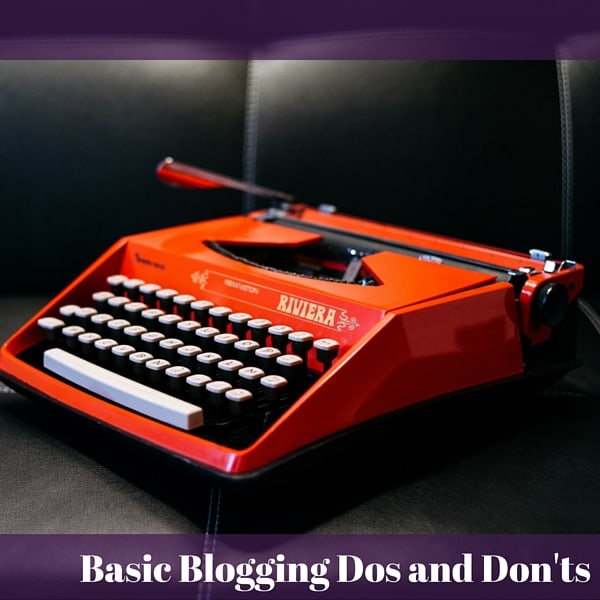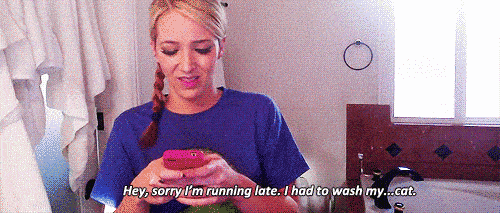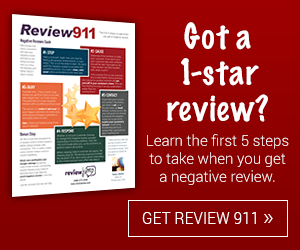
We weren’t all born into the world of blogging. Some of us had to learn blogging dos and don’ts. Some of us have yet to learn them.
In late summer of 2014, I taught a blogging class for middle school kids at The Cabin in Boise. My friend and former co-worker Kate Smith and I loosely went over the history of blogging, encouraged online safety, talked about fighting against trolls and bullies, and let the kids write whatever they wanted to.
We also watched a lot of cat videos and ate a fair amount of Otter Pops.
Kate did most of the heavy lifting, but we were both surprised at how quickly these kids caught on. They knew how to change everything about our class WordPress site before we got the chance to explain it. Their blog posts, which ranged from an in-depth Grand Theft Auto tutorial to an amazing series of puns, were fantastic.
I know those kids will surpass me. They probably already have.
Those kids were born into blogging. They’ve never known a world without it.

If you haven’t already started your own blog, or have yet to find your footing, you might not feel as confident as our middle school class.
I grew up around blogging, too, but I didn’t know what a LiveJournal or a BlogSpot was until I was in my late teens. Still, I spent my formative years around MySpace posts and LiveJournal entries that some of my good friends might file right to be forgotten requests for any day now.
If you haven’t been immersed in blogging for 15 or so years, it might seem overwhelming because there are no rules. You can write about whatever you want and present it in any format.
If you’re a business owner trying to start a blog, or trying to start your own agency blog, you probably want some rules. Some tender, loving guidelines to help you compete with the millions of blog posts published every single day.
These are the basics. They seemed to work for that class of middle schoolers (minus some of the more business-centric ideas), who will undoubtedly be the BuzzFeed and Gawker writers of the future, so they should work for you.
Let’s get you blogging like a middle schooler taking a summer class.
(Author’s Note: I dislike rules. Feel free to throw any of these out and find what works for you. I find these are practical for a business or agency blog, but they’re not universal. This is a list of dos and don’ts to help you feel less intimidated by the gigantic, sometimes-terrifying world of blogging)
Blogging Dos
I wish I could organize this like an old Vice Dos and Don’ts column, but I’m not mean spirited enough. I am funny enough, though. Just ask for my opinion on why Iron Man 3 got the character totally wrong, or why Deep Space 9 is the best Star Trek, and you’ll see it immediately.
Without further Ado (‘do’… see what I did there??)
DO Be Consistent

Source: Jenna Marbles, obviously
Find a schedule and stick to it. Even once a month is fine. Even if people like your content, they will totally abandon you when they think you’ll never write anything ever again. Don’t abandon your audience. As humans, abandonment is one of our primal fears.
But don’t worry. Elvis will come pick us all up in the mothership any day now. Until then, don’t abandon your blog just because you’re not seeing immediate results.
Your audience wants new content from you. Find a schedule you can keep and deliver that content onto them.
DO Show Your Human Side

Source: Memory Alpha
As you know, there are millions of blogs on the internet. Nearly as many as there are stars in the galaxy. So, how do you stand out?
Show who you are as a person. Tell a story. Give your own take. It’s the only thing that can really separate your blog from a near-infinite amount of other small business and agency blogs.
Let your personality shine through.
DO Provide Value

Provide value to your readers by answering their questions. Help solve their problems. If you receive a certain question from your customers more than once, it’s prime real estate for a blog post.
Don’t worry about “giving away the farm” or “sharing your secrets.” Instead, worry about providing something that’s worth reading.
When your readers need the product or service your business can provide, they’ll think of the people who helped them.
DO Use a Conversational Tone

When you blog, write in a conversational tone– don’t worry about being overly technical or formal. Also, vary your sentence length.
Use short paragraphs.
Use plenty of images, also. I recommend one per every 200 words, at the very least. Embedded YouTube videos are great, too.
DO Use Research and Cite Your Sources

People like research and statistics. You and I are no different. Statistics lend credibility to what you’re saying.
Please, though, for the love of Nate Silver, don’t make them up. Don’t just pull them off a website that doesn’t provide any sources.
Take this statistic, for example. ‘96% of contractors fail within the first two years.’ It’s cited by hundreds of contractor websites, yet no one ever provides an original source. Don’t contribute to an already-polluted internet with bogus stats.
Always use credible research sources, and always cite your sources. Don’t damage your credibility by being lazy about your research and citations.
DO Capture Email Signups

Do you want repeat readers? Do you want your blog to, you know, actually help sell your product or service?
Build an email list.
I liked this post, where Corey Dilley from Unbounce said:
Unbounce’s email list is the biggest asset we have for driving new acquisitions. Why? Email marketing consistently generates 80-90% of our landing page traffic when we launch a new campaign, piece of content or product feature. Email allows us to engage our audience in a creative, personalized way that blog posts or tweets can’t.”
Try out MailChimp and get started for free. No, I don’t work for MailChimp, but I hear their underwriting spots on NPR enough that I might as well.
Capturing emails and building a list is the first step towards making your blog work for you.
DO Focus On Your Audience

Don’t just talk about yourself. You can tell your own story, but also tell your audience’s story.
The customer is the hero of your business’ story, as per this post. Take it to heart.
Don’ts
Cue the John Carpenter music, because it’s about to get a little darker in here. It’s time for the Don’ts.
DON’T Just “Blog to Blog”

There should be a purpose behind everything you write. The purpose of this post is to help you start a blog you can be confident about and proud of, for example.
The purpose of our ReviewJunk series is to coax a laugh out of you when you’re being a little too grumpy and serious.
Each blog post you write should serve a function: telling a story, solving a problem, answering a question, or having a laugh. Don’t go in blind.
DON’T Phone It In

Your readers can tell when you’re not interested in what you’re writing.
We all have days where we’d rather not be blogging– especially people who do it for a living. But we have to power through.
You can always take a day off and come back to it when you’re inspired, but your readers can smell a “phoned in” blog right through their computer screen. Which sounds impossible. But trust me, it’s not.
Webcams are pretty impressive these days.
DON’T Be Overly Negative

I get mad and frustrated all the time. If you’ve ever driven more than three city blocks with me or have watched a political debate with me, you know this to be true.
Negativity comes naturally to humans. Sure, some people are relentlessly positive and never have a bad word to say about anyone or anything– but can we really trust those people?
We can all work on being more positive but, until then, we should leave the negativity out of our blog posts. Don’t be negative about your community, your competitors, or your customers.
It’s fine to express frustration, especially when it’s frustration your typical customers feel, too. But don’t complain about or insult other people if you can help it.
Build people up, don’t tear them down.
DON’T Get Discouraged

If your blog isn’t a success overnight, don’t sweat it. It takes some business blogs years to take off. There are no shortcuts, other than paid traffic. And that won’t always earn you customers or loyal readers.
Just keep at it. But remember– make sure there’s a point to every post you write. You have to work hard, but you can make success happen faster if you also work smart.
DON’T Be Overly Self-Promotional

Out of all these don’ts, this is the one I see happen the most often. Many business owners and agency marketers think their blog should be all about their product or service– and why you should buy it.
Resist the urge to be a salesperson. The occasional promotional post is fine, but you’ll never gain an audience for your blog if it’s all about you and how people should give you money.
Instead of being in “sales mode,” try rebooting into “help” mode. Give your readers something valuable. No one wants to read a new sales pitch once a week.
Okay, so those are the basics. I hope you feel better about starting a blog, or you’ve found renewed purpose for your existing blog.
With any luck and with these blogging dos and don’ts in tow, we’ll all be as good as those middle schoolers some day.
Question: What else do you want to know about blogging? I’ve done a fair amount, so I’d be glad to help you. Just ask me in the comments.






